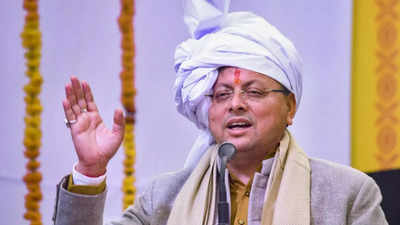A historic step towards legal uniformity, Uttarakhand is set to become the first state in India to implement the Uniform Civil Code (UCC), a move that has stirred political debates and national attention. The landmark legislation will be officially rolled out on January 27, just ahead of Prime Minister Narendra Modi’s arrival in the state.
The announcement was made by Shailesh Bagoli, secretary to the chief minister, who confirmed that the UCC will be implemented across the state and will also extend its reach to Uttarakhand residents living outside the state. The launch will be marked by the unveiling of the UCC portal at 12:30 pm at the State Secretariat, where CM Pushkar Singh Dhami will also oversee the event.
A groundbreaking move for legal reforms
The UCC seeks to establish a uniform set of personal laws governing marriage, divorce, inheritance, and succession. Under this code, marital conditions will be clearly defined, and legal provisions will aim to ensure social harmony and the protection of individual rights. Importantly, the UCC will apply to the entire state, with exemptions for Scheduled Tribes (STs) and certain protected communities.
For the first time in independent India, the implementation of such a uniform system will simplify legal processes surrounding family law, eliminating inconsistencies based on religion or community. Among its key features, the UCC mandates that all marriages, once the law is in force, must be registered within 60 days. Marriages that occurred from March 26, 2010, onward must also be registered within six months.
Key provisions of the UCC
The UCC also clarifies legal requirements for marriage, stating that only those who are mentally capable, have reached the age of 21 (for men) or 18 (for women), and are not already married may enter into a union. Marriages can be performed according to religious customs, but registration will be mandatory. This move is seen as an effort to ensure legal recognition of all marriages.
The UCC further addresses issues related to the creation and cancellation of wills and codicils under testamentary succession. Marriages solemnized before March 26, 2010, or those outside the state will also be eligible for registration if the legal requirements are met.
Political tensions surround the UCC
While the Uttarakhand government is eager to pioneer the implementation of the UCC, the move has sparked criticism from opposition leaders who argue that the law may lead to societal division along religious lines. They contend that the UCC, by attempting to standardize personal laws, might be impractical and overly ambitious.
However, Chief Minister Pushkar Singh Dhami has strongly defended the initiative, emphasizing that the UCC is not about divisiveness but about ensuring a uniform system of laws for all citizens. “This is not any divisive politics. UCC has a uniform system and uniform law for all,” Dhami stated in response to the criticism.
UCC portal: Simplifying registration and legal processes
In line with the implementation of the UCC, Uttarakhand will also launch a dedicated online portal, offering a streamlined and user-friendly approach to registering marriages, divorces, succession, and live-in relationships. The portal aims to make legal processes more accessible to the people, with citizens able to complete registrations from the comfort of their homes using mobile phones. Real-time updates on the status of applications will be available via email and SMS.
Additionally, the portal will include a transparent complaint redressal mechanism, ensuring that citizens can file complaints about any issues they may encounter with the registration process. The portal’s launch is expected to ease the implementation of the UCC, making legal processes faster and more efficient for Uttarakhand’s residents.
National impact of the UCC
The debate surrounding the UCC is not limited to Uttarakhand. The law has long been a subject of national discourse, especially in light of Article 44 of the Indian Constitution, which advocates for a uniform civil code across the country. In his Independence Day speech, Prime Minister Narendra Modi referenced the Supreme Court’s direction on the need for a common code, stressing that fulfilling the vision of the Constitution’s framers remains a national goal.
What’s next for UCC in India?
Uttarakhand’s move is likely to set a precedent, with other states potentially following suit. However, the success of the law’s implementation will depend on its ability to balance individual rights and social harmony. The coming weeks will offer a clearer picture of how the UCC will be received, both in Uttarakhand and across India.
With the UCC now in place, Uttarakhand stands at the forefront of a legal revolution that promises to simplify and harmonize personal laws in the state. But with political tensions rising, the road ahead may not be without its challenges. As India watches, Uttarakhand’s experience with the UCC will undoubtedly shape the future of personal law reform in the country.




